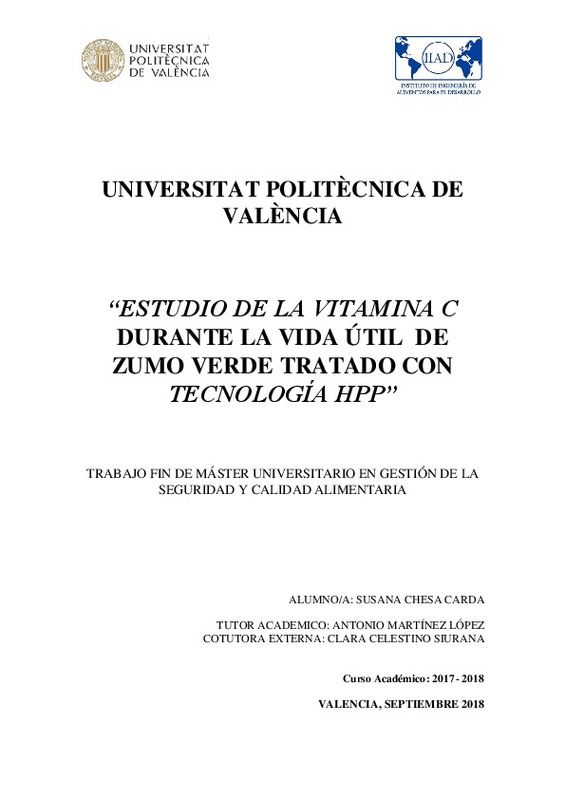JavaScript is disabled for your browser. Some features of this site may not work without it.
Buscar en RiuNet
Listar
Mi cuenta
Estadísticas
Ayuda RiuNet
Admin. UPV
Estudio de la vitamina c durante la vida útil de zumo verde tratado con tecnología HPP
Mostrar el registro sencillo del ítem
Ficheros en el ítem
| dc.contributor.advisor | Martínez López, Antonio
|
es_ES |
| dc.contributor.advisor | Celestino Siurana, Clara
|
es_ES |
| dc.contributor.author | Chesa Carda, Susana
|
es_ES |
| dc.date.accessioned | 2018-10-22T09:37:50Z | |
| dc.date.available | 2018-10-22T09:37:50Z | |
| dc.date.created | 2018-09-27 | |
| dc.date.issued | 2018-10-22 | es_ES |
| dc.identifier.uri | http://hdl.handle.net/10251/111022 | |
| dc.description.abstract | [ES] Ante la necesidad de justificar el contenido en vitamina C durante el tiempo de vida útil de los zumos y bebidas refrescantes con tratamiento HPP a 5000 bar durante tres minutos y poder así utilizar correctamente las declaraciones de propiedades saludables correspondientes según la nueva normativa de etiquetado, Directiva 90/496/CEE. Se procede a realizar un estudio de la evolución de la concentración de la vitamina C con respecto al tiempo, hasta agotar la vida útil del producto tratado por alta presión hidrostática. Se comparó un zumo, compuesto por manzana, espinaca, pepino y limón llamado a partir de ahora zumo verde, con y sin tratamiento por HPP así como la evolución de un patrón de concentración conocida de ácido ascórbico con respecto al tiempo de vida útil. De forma paralela, se estudió como afectan dos metodologías distintas de limpieza y desinfección de la materia prima sobre las concentraciones de colonias microbianas ya existentes. Y como consecuencia, la efectividad del tratamiento HPP según los valores iniciales de contaminación microbiana. Concluyendo, que a mayor concentración de cloro activo en el agua de limpieza mayor es la efectividad sobre la limpieza y desinfección de la flora microbiana. Y como consecuencia el tratamiento HPP es mucho más efectivo y se alarga la vida útil de producto. Se confirma, además, que durante toda la vida útil del producto se mantienen los valores de concentración de vitamina C mínimos para poder anotar en el etiquetado la declaración nutricional FUENTE DE VITAMINA C . | es_ES |
| dc.description.abstract | [EN] Given the need to justify the content of vitamin C during the shelf life of juices and soft drinks with HPP treatment at 5000 bar for three minutes and be able to correctly use the corresponding health claims according to the new labeling regulations, Directive 90/496 / EEC. A study is made of the evolution of the concentration of vitamin C with respect to time, until exhausting the useful life of the product treated by high hydrostatic pressure. We compared a juice, composed of apple, spinach, cucumber and lemon called from now on green juice, with and without treatment by HPP as well as the evolution of a known concentration pattern of ascorbic acid with respect to the shelf life. In parallel, it was studied how they affect two different methodologies of cleaning and disinfection of the raw material on the concentrations of existing microbial colonies. And as a consequence, the effectiveness of the HPP treatment according to the initial values of microbial contamination. Concluding, that the higher the concentration of active chlorine in the cleaning water, the greater the effectiveness on the cleaning and disinfection of the microbial flora. And as a consequence, HPP treatment is much more effective and the product's useful life is extended. It is also confirmed that the minimum vitamin C concentration values are maintained throughout the product's useful life in order to record the nutritional declaration "SOURCE OF VITAMIN C" on the labeling. | es_ES |
| dc.format.extent | 20 | es_ES |
| dc.language | Español | es_ES |
| dc.publisher | Universitat Politècnica de València | es_ES |
| dc.rights | Reconocimiento - No comercial (by-nc) | es_ES |
| dc.subject | Vitamina C | es_ES |
| dc.subject | HPP | es_ES |
| dc.subject | vida útil | es_ES |
| dc.subject | declaraciones nutricionales | es_ES |
| dc.subject | zumos | es_ES |
| dc.subject | COLD PRESSED | es_ES |
| dc.subject | Vitamin C | es_ES |
| dc.subject | useful life | es_ES |
| dc.subject | nutritional declarations | es_ES |
| dc.subject | juices | es_ES |
| dc.subject.classification | TECNOLOGIA DE ALIMENTOS | es_ES |
| dc.subject.other | Máster Universitario en Gestión de la Seguridad y Calidad Alimentaria-Màster Universitari en Gestió de la Seguretat i Qualitat Alimentària | es_ES |
| dc.title | Estudio de la vitamina c durante la vida útil de zumo verde tratado con tecnología HPP | es_ES |
| dc.type | Tesis de máster | es_ES |
| dc.rights.accessRights | Abierto | es_ES |
| dc.contributor.affiliation | Universitat Politècnica de València. Departamento de Tecnología de Alimentos - Departament de Tecnologia d'Aliments | es_ES |
| dc.contributor.affiliation | Universitat Politècnica de València. Escuela Técnica Superior de Ingeniería Agronómica y del Medio Natural - Escola Tècnica Superior d'Enginyeria Agronòmica i del Medi Natural | es_ES |
| dc.description.bibliographicCitation | Chesa Carda, S. (2018). Estudio de la vitamina c durante la vida útil de zumo verde tratado con tecnología HPP http://hdl.handle.net/10251/111022 | es_ES |
| dc.description.accrualMethod | TFGM | es_ES |
| dc.relation.pasarela | TFGM\96902 | es_ES |
Este ítem aparece en la(s) siguiente(s) colección(ones)
-
ETSIAMN - Trabajos académicos [3541]
Escuela Técnica Superior de Ingeniería Agronómica y del Medio Natural






